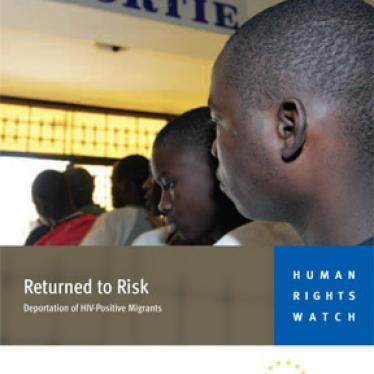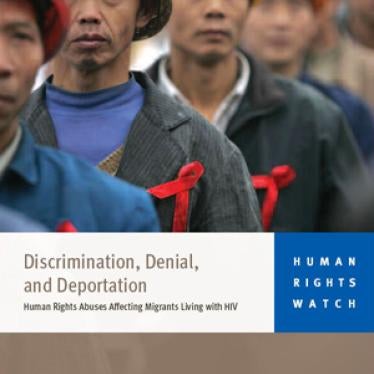(London) - National governments, in cooperation with international agencies and donors, should reconsider deportation policies for people living with HIV/AIDS, four HIV/AIDS and human rights groups said in a report released today.
The 27-page report, "Returned to Risk: Deportation of HIV-Positive Migrants," was prepared by Human Rights Watch, Deutsche AIDS-Hilfe, the European AIDS Treatment Group, and the African HIV Policy Network. It describes cases in South Korea, Saudi Arabia, the United Arab Emirates, South Africa, and the United States in which HIV-positive migrants were deported, and describes the need to develop policies guaranteeing uninterrupted treatment for this population.
"Migrants living with HIV are often explicitly excluded from treatment," said Katherine Todrys, researcher with the Health and Human Rights Division at Human Rights Watch. "If they are detained, they are often denied access to antiretroviral drugs, and then if deported they can't get care."
The groups called on governments and donors to ensure that HIV-positive migrants have access to life-saving antiretroviral therapy when detained and to ensure that, if deported, migrants are able to maintain access to treatment and care.
International human rights and refugee law has long prohibited deportations to a state where the person deported would be at real risk of being subjected to torture or other cruel, inhuman, or degrading treatment or punishment. National deportation procedures, however, are often insufficient or underdeveloped to protect the rights of people living with HIV against return to such conditions, the report's authors said. In addition, many countries fail to provide treatment for migrants living with HIV in immigration detention. Lack of continuity of treatment for migrants may lead to illness, premature death, or the development of drug resistance.
"Rather than protecting HIV-positive migrants from return to countries where treatment is unavailable, some countries are in fact deporting migrants because of their HIV status," said Peter Wiessner, of Deutsche AIDS-Hilfe. "Migrants are being returned to situations in which treatment and support are entirely unavailable."
The report documents:
- In Saudi Arabia: mandatory HIV testing; detention for up to a year without access to medication; and deportation of HIV-positive migrants.
- In the United Arab Emirates: deportation of 1,518 non-citizen residents infected with HIV; hepatitis types B and C; or tuberculosis in 2008.
- In South Africa: the inability to continue treatment - amounting to a death sentence - for people living with HIV who are sent back to Zimbabwe.
- In the United States: poor access to treatment in detention and harsh conditions or lack of access to medical treatment for some HIV-positive individuals who are deported.
- In South Korea: mandatory HIV testing of migrants and the deportation of those found to be HIV positive, despite South Korea's international legal obligations and a recent Seoul High Court ruling that such deportation is not the most effective means of protecting public health.
"Governments have committed themselves to the goal of universal access to HIV treatment for all who need it by 2010," said Titise Kode of the African HIV Policy Network. "But with 192 million people - or 3 percent of the world's population - living outside their place of birth, ensuring migrants' and deportees' access to HIV treatment is absolutely essential to meeting this goal."
The report's authors called on governments to ensure that HIV-positive individuals awaiting deportation in detention have access to treatment and to re-examine the practice of deporting HIV-positive individuals to countries where treatment and social support structures are inadequate.
"Migrants face enormous risks when they cross borders," said David Hans-Ulrich Haerry, of the European AIDS Treatment Group. "But they shouldn't face a death sentence for living with HIV when we have effective treatment available and governments worldwide have pledged to provide universal access to antiretroviral medicine and have committed themselves to international treaties that guarantee migrants protection."








